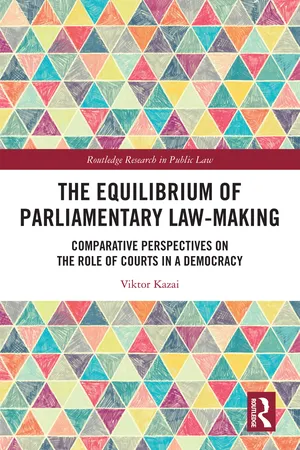
The Equilibrium of Parliamentary Law-making
Comparative Perspectives on the Role of Courts in a Democracy
- 288 pages
- English
- ePUB (mobile friendly)
- Only available on web
The Equilibrium of Parliamentary Law-making
Comparative Perspectives on the Role of Courts in a Democracy
About This Book
This book is a response to the dangers posed to constitutional democracy by the continuous growth of executive power and the simultaneous decline of parliaments' role in policy formation. These phenomena are often manifested in the manipulation and even the violation of the rules of parliamentary law-making, called irregularities. If left without consequences, these irregularities can ultimately lead to the elimination of the procedural constraints imposed on the ruling political forces to prevent their arbitrary exercise of power. This work investigates the constitutional significance of the irregularities of parliamentary law-making and explores the role that courts play in the remedy of these flaws. The analysis is premised on the concept of equilibrium. This explanatory concept denotes an ideal state in which parliamentary law-making complies with the requirements of constitutionalism, and judicial review is conceptualized as a mechanism suitable to achieve this aim. The volume places the judicial review of the regulation and the practice of parliamentary law-making at its center and discusses all the relevant legal concepts, institutions, and doctrines. It combines theoretical analysis with case law-centered comparative research covering a large number of decisions delivered by apex courts operating in various jurisdictions. Due to this methodological choice, the book aims to simultaneously contribute to the scholarly discourse and provide useful information to practicing lawyers and policymakers working in the areas of constitutional law and politics and comparative law.
Frequently asked questions
Information
Table of contents
- Cover
- Half-Title
- Series
- Title
- Copyright
- Dedication
- Contents
- Acknowledgements
- Glossary
- List of figures
- List of tables
- Introduction
- 1 The equilibrium of parliamentary law‑making: A normative standard derived from the principles of constitutionalism
- 2 The disturbance of the equilibrium: Non-compliance with the requirements of constitutionalism
- 3 Guardians of the equilibrium: Non-judicial and judicial enforcement of the requirements of constitutionalism
- 4 How to recognize disturbances in the equilibrium?: Standards in constitutional judicial review
- 5 The preservation and restoration of the equilibrium: Judicial enforcement of the requirements of constitutionalism
- 6 The extent of judicial influence in the equilibrium: Judicialization of parliamentary law-making
- 7 A long road towards the achievement of equilibrium: Legislative riders in France
- 8 An equilibrium never searched thus never found: Lack of public participation in law-making in Hungary
- Conclusion
- Index